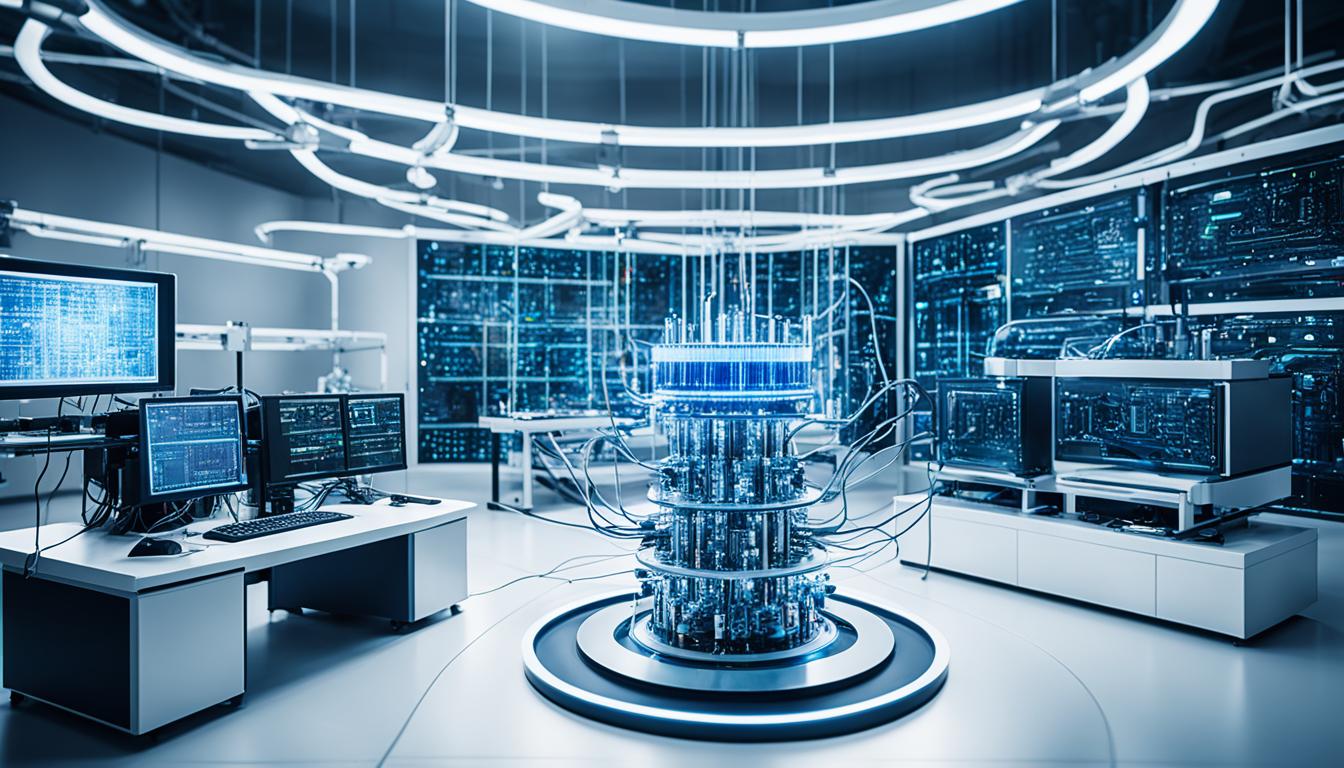Did you know that quantum machine learning is transforming the field of cryptographic key generation, revolutionizing data security in the digital age?
Quantum cryptography, powered by AI algorithms, utilizes the principles of quantum mechanics to ensure the utmost security in data encryption. The convergence of quantum machine learning and cryptography has led to significant advancements in key distribution, attack mitigation, random number generation, and threat detection.
Quantum key distribution (QKD) systems, powered by AI algorithms, enhance the efficiency and security of key exchange protocols by adapting to quantum noise and channel variations. Additionally, AI-driven systems can anticipate and counteract quantum attacks in real-time, making it highly challenging for malicious actors to compromise data.
Furthermore, quantum random number generators (QRNGs), optimized by AI algorithms, provide a source of true randomness, ensuring the security of cryptographic keys. In combination with AI-powered quantum machine learning models, large datasets generated by quantum cryptography systems can be analyzed to enable rapid detection of anomalies and potential security breaches.
The future of quantum cryptography holds promise for the development of quantum-safe cryptographic algorithms, democratized quantum encryption services, and the application of quantum cryptography in securing the Internet of Things (IoT) ecosystem.
Key Takeaways:
- Quantum machine learning is transforming cryptographic key generation and enhancing data security.
- AI algorithms optimize key distribution, attack mitigation, and random number generation in quantum cryptography.
- Quantum key distribution systems adapt to quantum noise and channel variations in real-time.
- Quantum random number generators certified by AI algorithms provide true randomness for secure cryptographic keys.
- AI-powered quantum machine learning models analyze large datasets for rapid threat detection and anomaly identification.
The Role of AI in Quantum Cryptography
AI plays a crucial role in advancing the field of quantum cryptography, enhancing the security and efficiency of cryptographic key generation. By leveraging AI algorithms and integrating them into quantum key distribution (QKD) systems, key exchange protocols are optimized to adapt to quantum noise and channel variations, ensuring flawless and secure distribution of cryptographic keys.
AI-powered quantum attack mitigation systems are instrumental in countering potential threats. They anticipate quantum attacks in real-time and dynamically adapt encryption strategies, making it exceptionally challenging for malicious actors to compromise data. This AI-powered defense mechanism provides an added layer of protection, bolstering the security of quantum cryptography.
Another significant area where AI proves its value is in the optimization of quantum random number generators (QRNGs). By incorporating AI algorithms, QRNGs can certify the randomness of generated keys with enhanced security. This critical capability ensures the integrity and confidentiality of cryptographic keys, safeguarding sensitive information.
Furthermore, quantum machine learning plays a pivotal role in threat detection within quantum cryptography systems. AI-powered quantum machine learning models analyze vast datasets collected from quantum cryptography systems, enabling the detection of anomalies and potential security breaches in real-time. This proactive approach enhances the overall security posture and helps prevent cyber threats.
AI algorithms optimize key exchange protocols, anticipate quantum attacks, and certify the randomness of generated keys, thereby enhancing the security and efficiency of cryptographic key generation in quantum cryptography.
The convergence of AI and quantum cryptography leads to groundbreaking advancements, fortifying data protection and overall security. By harnessing the power of AI algorithms, quantum key distribution becomes more resilient and reliable, ensuring the secure exchange of cryptographic keys. AI-powered quantum attack mitigation mechanisms provide robust defense against evolving threats in real-time. Additionally, the certification of true randomness through AI-optimized QRNGs guarantees the integrity of cryptographic keys. Ultimately, the integration of AI and quantum machine learning enables the proactive detection of anomalies and potential security breaches, enhancing the overall threat detection capability of quantum cryptography systems.
Comparison Table: AI and Quantum Cryptography Features
| Features | AI | Quantum Cryptography |
|---|---|---|
| Key Distribution | Optimizes key exchange protocols | Enables secure distribution of cryptographic keys |
| Attack Mitigation | Anticipates and counters quantum attacks | Enhanced defense against malicious actors |
| Random Number Generation | Optimizes QRNGs for enhanced randomness | Certifies the integrity of generated keys |
| Threat Detection | Proactively identifies anomalies and security breaches | Enables real-time security monitoring |
The Future of AI in Quantum Cryptography
The future of AI in quantum cryptography holds immense potential for further advancements. AI will play a pivotal role in the development of quantum-resistant cryptographic algorithms, ensuring the long-term security of data in the face of advancements in quantum computing.
With AI-driven automation, quantum encryption services will become more accessible to organizations of all sizes, democratizing the adoption of quantum cryptography for data protection. This shift will empower businesses to implement robust security measures that can withstand the threats posed by quantum computing.
Furthermore, quantum cryptography will find significant applications in securing the vast network of interconnected devices in the Internet of Things (IoT) ecosystem. By integrating AI-enhanced quantum cryptography into IoT devices and infrastructure, critical communications can be safeguarded, and cyber threats can be prevented. The combination of AI and quantum cryptography will play a crucial role in protecting sensitive data across sectors such as telecommunications, energy, manufacturing, and defense.
This symbiotic relationship between AI and quantum cryptography promises to shape the future of data security, fortifying the foundations of protection in an increasingly interconnected world. By harnessing the potential of quantum-safe cryptography, organizations can ensure the confidentiality and integrity of their data, bolstering trust among consumers and stakeholders alike.

Leave a Reply